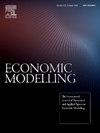Improving macroeconomic model credibility: Reducing reliance on frictions through observed inflation expectations
IF 4.7
2区 经济学
Q1 ECONOMICS
引用次数: 0
Abstract
This paper reassesses the credibility of rational expectations in dynamic stochastic general equilibrium (DSGE) models by examining their limitations in capturing real-world macroeconomic dynamics. Using the Smets and Wouters model as a baseline, we incorporate various survey-based measures of inflation expectations to evaluate their effects on model fit and forecasting accuracy. The framework is extended to include financial frictions, unemployment, time-varying inflation targets, and news shocks. Results show that incorporating observed inflation expectations improves model fit, reduces posterior uncertainty around shocks, and lowers reliance on ad hoc rigidities such as indexation and investment adjustment costs, particularly in case of U.S. data. However, these expectations do not consistently improve the model’s ability to replicate key macroeconomic moments. The magnitude and direction of improvements vary across model variants and between the U.S. and the Euro area. Robustness checks suggest that observed expectations help mitigate the effects of structural breaks. Overall, the findings enhance model predictions and challenge the sufficiency of relying solely on rational expectations in DSGE models.
提高宏观经济模型的可信度:通过观察到的通胀预期减少对摩擦的依赖
本文通过考察动态随机一般均衡(DSGE)模型在捕捉现实世界宏观经济动态方面的局限性,重新评估了其理性预期的可信度。以Smets和Wouters模型为基准,我们纳入了各种基于调查的通胀预期指标,以评估它们对模型拟合和预测准确性的影响。该框架被扩展到包括金融摩擦、失业、时变通胀目标和新闻冲击。结果表明,纳入观察到的通胀预期改善了模型拟合,减少了冲击的后验不确定性,并降低了对特定刚性的依赖,如指数化和投资调整成本,特别是在美国数据的情况下。然而,这些预期并不能持续提高模型复制关键宏观经济时刻的能力。改善的幅度和方向在不同的车型以及美国和欧元区之间有所不同。稳健性检验表明,观察到的预期有助于减轻结构性断裂的影响。总体而言,这些发现增强了模型预测,并挑战了DSGE模型仅依赖理性预期的充分性。
本文章由计算机程序翻译,如有差异,请以英文原文为准。
求助全文
约1分钟内获得全文
求助全文
来源期刊

Economic Modelling
ECONOMICS-
CiteScore
8.00
自引率
10.60%
发文量
295
期刊介绍:
Economic Modelling fills a major gap in the economics literature, providing a single source of both theoretical and applied papers on economic modelling. The journal prime objective is to provide an international review of the state-of-the-art in economic modelling. Economic Modelling publishes the complete versions of many large-scale models of industrially advanced economies which have been developed for policy analysis. Examples are the Bank of England Model and the US Federal Reserve Board Model which had hitherto been unpublished. As individual models are revised and updated, the journal publishes subsequent papers dealing with these revisions, so keeping its readers as up to date as possible.
 求助内容:
求助内容: 应助结果提醒方式:
应助结果提醒方式:


